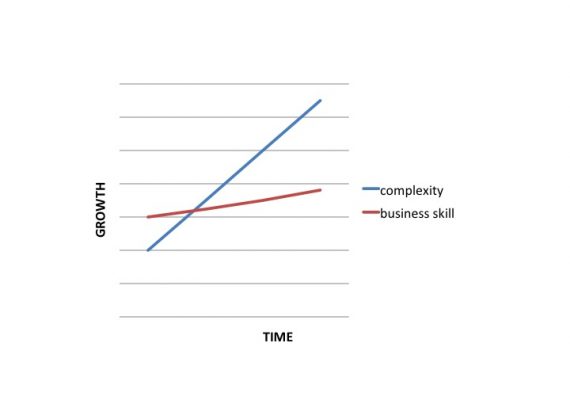The post Business skills and lessons learned appeared first on Paul Terry & Associates.
]]>Do your business skills match your business’ complexity?
I recently shared six tips on this topic and asked other small business owners about their experiences. How did their business skills match the complexity of their business when they first opened? How have they dealt with this tension throughout their business’ evolution? What advice would they want to share with others?
In previous posts Heidi Gibson of The American Grilled Cheese Kitchen and Rachel Saunders of Blue Chair Fruit shared their stories with us. Here are two more business owners tackling complex issues and leveraging their management skills.
Elizabeth Leu
Fiddlesticks
When Elizabeth Leu started Fiddlesticks, a children’s boutique in Hayes Valley, she thought she was prepared. She first worked for someone else and learned as much as she could about the retail business. Elizabeth also took the Renaissance Entrepreneurship Center Business Planning class.
She started her business with a solid foundation of hands-on experience, working for others, and thoughtful planning. Yet she couldn’t prepare herself for what it would actually feel like when she was completely responsible for her own business and all its complexities.
“As a small business owner you have to be the master of all in everything you do, and that’s not easy. You have to wear ALL the hats and ideally, they should all fit. I think management capacity is finding the correct fit with all those hats — and that’s hard! It takes a lot of time and experience to get them all to fit.”
Elizabeth’s advice:
Learn as much as you can about every role in your business.
“You may love only a few of those hats but you have to figure out, master and tolerate them all — at least in the beginning until you can outsource. Once you get strong enough to outsource, you still need to understand how it all works to keep a watchful eye on the whole operation.”
Stay positive and just keep going.
“I have worked very hard to grow my business and I have had some significant setbacks. With every setback I can either choose to learn from it or become bitter and harbor frustrations. I have worked hard to learn from them. All of the setbacks were complex and difficult, especially because it was uncharted territory for me. But I learned and I am still learning. What is it they say, ‘two steps forward, one step back’? As long as you move forward, business complexity feels easier because you keep breaking it down, tackling it piece by piece.”
Claire Keane
Clairesquares
Claire Keane, owner of the artisan, handcrafted sweet treats company Clairesquares, says that her business skills did not match the complexity of her business when she started. She had a steep learning curve. But Claire gained the skills she needed by seeking out specific business knowledge and support and her daily experiences in business brought many lessons learned.
Claire’s key steps for developing core business skills:
Write a business plan.
Claire took the 14-week Business Planning Class at the Renaissance Entrepreneurship Center and wrote a business plan. “To this day, I frequently remember key pointers from each class.”
Join an incubator.
Claire joined La Cocina’s Incubator Kitchen and received the help of that community and all their support services.
Attend lots of workshops.
Claire learned from others to increase her skills. “Whenever there was a workshop relevant to my lack of skills, I made sure to attend it. I was able to take tips from each training and apply it to my business immediately.”
Develop a support team.
Claire knew that she could not do it all alone. “It was very helpful to have a business mentor, new business friends with similar start-up business pains and other friends and family to lean on for advice to get me through the learning curve.”
Keep at it, even through failure.
Ultimately it has been Claire’s tenacity and her perseverance that has made her business a success. “No amount of workshops can prepare you for real world experience. In the end, I learned from trying, failing, and trying again.”
Check out these additional tips on balancing business skills with business complexity. What has worked for you and your business?
The post Business skills and lessons learned appeared first on Paul Terry & Associates.
]]>The post Business advice from the field appeared first on Paul Terry & Associates.
]]>In that tradition, I asked some of my clients and past students to share their thoughts on a common growth challenge for small business owners: balancing business skills with the complexity of the business. I recently shared six key considerations on this topic. I was curious to hear from small business owners in the trenches. How did their business skills match the complexity of their business when they first opened? How have they dealt with this tension throughout their business’ evolution? What advice would they want to share with others?
Here is one story…
Heidi Gibson and Nate Pollak
The American Grilled Cheese Kitchen

When Heidi and her partner Nate opened The American Grilled Cheese Kitchen they already had general business expertise, people management skills and financial management experience but they were new to the restaurant industry and lacked specific industry skills. Heidi and Nate’s approach was to be honest with themselves about their own abilities and get help. “We took a cold hard look at what we did and did not know how to do, and then we recruited advisers who could teach us, or hired staff who already had the skills we lacked.”
Heidi and Nate took a similar approach when opening their second location. They had never run a multi-unit operation before. They sought consulting from other multi-unit operators, and hired general managers for each store who had come from multi-unit backgrounds. “We tasked the managers in the stores with the responsibility of ensuring consistency across the stores, not just within their own. For us, hiring managers who brought experiences and skills to the table that we did not have ourselves was crucial.” With the added complexity of two locations, Heidi and Nate decided to outsource their bookkeeping, too. “We hired a bookkeeper who had deep experience with multi-unit restaurants, which brought more expertise to our operation and freed up our time to handle other issues.”
Just this month Heidi and Nate opened their third location and published a cookbook, Grilled Cheese Kitchen: Bread + Cheese + Everything in Between!
Heidi’s advice for other small business owners:
Be brutally honest about what you are good at and what you’re not.
For the things you are not good at, find a way to outsource them to someone who is good at them. This goes double for bookkeeping and accounting if you are in a high-volume, low-margin business.
Ask for help.
There are a lot of resources out there for growing business owners, including Renaissance, SBDC, ICA and most importantly, other business owners. People want to see you succeed and you’ll be surprised at how much they want to help.
Don’t skip financial forecasting.
Many small business owners underestimate their financial management needs and make mistakes with finances when starting or expanding a business. The worst-case scenario is running out of cash, and sometimes growing can really chew up cash. You’re in a much stronger position to secure financing before you run out of cash rather than waiting until you’re down to the wire. Take the time to forecast cash flow, accounting for your growth needs, and start investigating funding options early rather than late.
Check out these tips on balancing your business skills with your business’ complexity and stay tuned for more words of wisdom from small business owners!
The post Business advice from the field appeared first on Paul Terry & Associates.
]]>The post How to Handle Business Complexity appeared first on Paul Terry & Associates.
]]>
If you start a business slowly, you may be able to handle everything yourself. If you only have one or two products or a limited customer/client base, your systems can be quite simple. But…
- Are you financially sustainable?
- Can you generate enough capital or cash flow to reach break-even?
- Is the business profitable?
To create a self-sufficient business, you may have to scale up or increase your business’ complexity. And as you do so, your business skills and management capacity must keep pace. Getting this balance right is an on-going issue. To grow the small business, things get complicated… perhaps more than you can manage well.
- Is it better to wait until you have all the skills to handle the increased complexity?
- Do you go ahead and grow now and hope that you will develop the skills “on the fly” to be successful and sustainable?
- Should you hire someone with more expertise to help you?
To manage your business’ increasing complexity, it is essential to focus on these six key areas:
1. Pay attention to the your weak links.
Your lack of skills as a small business owner in any key area of your business (management, operations, finances or marketing) can limit your success. There is a good chance you already know your areas of weakness. Cash flow management? Operational systems? Managing others? Take the time to identify a key weakness and make it a strength. (Think about a simple SWOT analysis.)
2. Improve your own business skills now.
Find the help you need NOW before your current knowledge limits your business. This may mean taking a class, reading a book, following relevant blogs, finding a peer mentor, or working with a business adviser or coach. The key is to put aside some regular time (every day, week or month) for your personal education.
3. Bring in others with the skills you need.
Being a small business owner does not mean that you have to know how to do everything yourself or that you have to do it all alone. Often the smartest approach is to hire someone who can do a particular business task better than you. This could be an outside professional or an employee with skills in the specific area of need, such as a bookkeeper to help you manage cash flow, or an employee good at sales. (It may only be a short-term need until your internal systems improve.)
4. Take a leadership role.
You may have started your business because you love making your product. But to create a successful business you may need to hire someone else who can make the product at a cheaper price. This could be an employee that works directly under your supervision, or an outside manufacturer or co-packer. (See these six tips when planning to hire employees and step into a leadership position.)
5. Put good systems in place.
It is challenging to take on larger projects, additional clients or more employees if you don’t have clear (and documented) systems. It is hard to hire someone else to help you if you need to take a lot of time to show them how to do the work because it is all in your head instead of written down. Without good systems, it is also harder to take a break!
6. Don’t stop planning.
Growing a business can sometimes feel like a set of spiral movements around and around—seemingly sending you one place and then another. Yet your business challenges and your careful responses to those challenges can create a great foundation for growth. A solid business plan can also help you predict and prepare for the complexities ahead. Remember, planning isn’t a one-time thing. It helps you to take the pulse of your business—over and over again. So, take the time to identify your weaknesses, challenges and opportunities and create a plan to take your business to the next level.
At Paul Terry & Associates, we work with many small businesses that are confronting the tension between management capacity and business complexity. Some clients are eager to grow their businesses but feel stuck, unsure how to reach the next level or increase sales given current skills or resources. Some clients are struggling to keep up with the demand for their products/services. Using an action planning approach, we work with small business owners to assess the current situation and create a road map to reach their goals. Our goal is to help clients prepare for the road ahead, manage the increasing complexities, and build businesses that are profitable and sustainable for the long term.
The post How to Handle Business Complexity appeared first on Paul Terry & Associates.
]]>The post Entrepreneurs of the Year appeared first on Paul Terry & Associates.
]]>Established Entrepreneur of the Year Award

Wendy Lieu, owner of Socola Chocolatier, had already been operating her chocolate business part-time with her sister for many years when she took the Business Planning class in 2012. With the business skills and confidence she gained in the class, she was ready to take the business to the next level. In early 2014 Wendy and her sister Susan opened their retail shop on Folsom Street in San Francisco. They now employ five people and also have a thriving wholesale business!
Emerging Entrepreneur of the Year Award

Antoinette Sanchez, owner of Endless Summer Sweets, was a long-time Renaissance employee who worked with me to coordinate the Business Planning Class at Renaissance SoMA. She took all the Renaissance classes, received access to financing support from Gwendolyn Wright of The Wright Consultants, and studied with La Cocina. She left Renaissance two years ago to focus full-time on bringing funnel cakes and kettle corn to parties, events and street festivals all over the Bay. She will soon open her own store on Shattuck Avenue in Berkeley!
A graduate of the Business Planning class and a long-time Renaissance business incubator tenant, Brigette Renee LeBlanc, owner of LeBlanc and Associates, LLC has used all her training, support and referrals to develop her own business providing full-service event consulting to Bay Area clients.
These three women were committed students, wrote great business plans and took what they learned and applied it to their businesses. We are so proud of them and what they have accomplished. Please join me in congratulating these amazing small business owners!
Join Renaissance at City View Metreon on Wednesday October 7 at 5:30pm to honor the Entrepreneurs of the Year and enjoy the Renaissance pop-up café, dessert bar and marketplace. Many Business Planning Class graduates will be in attendance. Many graduates have generously donated their products and services to the auction, including Heidi Gibson of The American Grilled Cheese Kitchen, Seán Patrick of Calibur, Gail Lillian of Liba Falafel, Nick Hormuth of Pedal Inn Bike Tours and Provisions, and Steve Fox of Urban Putt. We invite you to attend the Gala, reconnect with business colleagues, and enjoy the program plus networking, food and music!
The post Entrepreneurs of the Year appeared first on Paul Terry & Associates.
]]>The post Getting into Business appeared first on Paul Terry & Associates.
]]>
Passion is essential
First, passion and conviction are essential. You need to know who you are and what you want to do. Then there is the choice of business model and knowing your product or service inside and out. You want to be ready to eat, drink and breathe business ownership… and wake up and do it again the very next day.
Know your market
Even if you have the best business idea and you are confident in your ability to make a product or provide a service and set up a successful business model, the great arbiter of success is the marketplace. Your business concept must be viable, not just to you, but to the people who will be your target market. How do you know your business expectations are not fiction? To get the answer, you must talk to people, survey potential customers or clients, and test your assumptions.
Test your concept
Once you have an idea of the marketplace, you want to test the concept. You can pop up in someone else’s space or test your product or service at a street fair or makers fair. You can get friends to hold events and sell your product in their living rooms. You can convince a friend who has a retail shop to let you set up a trunk show. If all goes well, the experience will make you feel more secure that your business idea is a good one and that you want to own and run a business.
Can you now say YES to these 5 key questions?
- Do I really enjoy being in business?
- Can I attract the customer or client who will appreciate my business and will pay for it?
- Am I good with customers and can I provide excellent service?
- Does my business model make money or will it at least break even “soon”?
- Can I envision myself persevering for the next 12 to 18 months to really establish my business?
Time for planning
Some degree of prior business planning is essential. To help guide you, you can take a class, read a book, or ask an experienced business owner for support. However you do it, the purpose of a plan is to define your business offerings, specify your market, outline the essential management skills needed, and create realistic financial projections with a well-timed series of action steps. Your final plan will be a useful document for potential investors, funders or business partners. But the primary purpose for writing a plan is for the process itself. It forces you to be objective and critical, identifying weaknesses, challenges and opportunities and setting benchmarks to track progress. Ultimately, it will give you confidence to get into and continue with the business.
Take the plunge
So you have made some initial sales, carved out time on weekends to work on the business and you are still excited about doing it. Actually, it is all you can think about. How do you take the plunge from part-time to all-in?
There are many different ways to do it.
- Wait to launch until you have raised enough start -up capital – either through personal savings, bank loans or crowd fundraising.
- Convince your friends and family to lend you money (perhaps with no interest) and agree that you do not have to pay them back for at least three years.
- Approach your employer and negotiate to work only four days a week and use that extra day to work on your business.
- Move from full-time employment to a contractual arrangement so that you can set your own hours and take time off when needed for the business.
- Find an active or silent business partner with capital to invest in the new business and cover business expenses for the first year.
- Marry well and/or use your future inheritance to support your entrepreneurship habit!
- Quit your job and go all in right away, using credit cards to get you through the cash flow negative start-up period.
The path to small business ownership is unique for each entrepreneur. It depends on your tolerance for risk, your access to capital and cash flow, your skills and experience running/managing a similar enterprise, and your support systems.
Time, money and the prospect of failure are common hurdles for almost every small business owner starting out:
- How do I find enough time to devote to my business?
- Do I have enough funds to support myself while the business is developing/evolving in the first 6, 12 or 18 months?
- Can I respond well to short-term failures as I navigate my way to long-term success?
You may struggle to find the right strategy to get your business off the ground but if you have passion for your business idea, some success from product or service testing, solid financial projections, and a strong support network… YOU CAN DO THIS!
Are entrepreneurs crazy? Sometimes yes. But that’s just what may be needed to jump in and swim! Some start in the shallow end of the pool and tip-toe down the stairs. Others lower themselves down the ladder until they are fully immersed but continue to hold onto the edge. And then there are the ones who leap off the diving board straight into the deep end. No matter your approach, just make sure you can see the edge and make your way back to solid ground as needed. But if you really want to swim in the world of small business ownership, you first just have to get into the water!
The post Getting into Business appeared first on Paul Terry & Associates.
]]>The post Do you have an entrepreneurial dream? appeared first on Paul Terry & Associates.
]]>
“When it came to launching my own business, I needed a plan. I couldn’t just work it out on a cocktail napkin. I needed time to think it through. I might be brave and adventurous, but I’m also very methodical.
An entrepreneurial friend told me that she’d registered for a Business Planning Class at the San Francisco Renaissance Entrepreneurship Center. They offered a 14-week planning session to help entrepreneurs work on their business plan and give their idea wings.
So I decided to register… I worked on firming up my idea, looking at it from all angles, and finally creating a robust business plan that would set me up for success.
I can’t recommend the RenCenter enough. Today it has offices in SF, the Peninsula, and Marin, with more small business incubators for new entrepreneurs. Sharon Miller is an amazing CEO and visionary. Their instructors are brilliant (special shout out to my mentor, Paul Terry) and the support is amazing. They are not your Shark Tanks.”
(thanks for the shout-out, Josiane!)
Now, Josiane wants to encourage others who are passionate about a business idea and ready to take the plunge. TeleSmart Communications is offering a scholarship to one lucky person who would like to register for Renaissance Entrepreneurship Center’s 14-week business planning class in 2015.
Do you have an entrepreneurial dream? Click here to learn more about TeleSmart’s scholarship opportunity!
The post Do you have an entrepreneurial dream? appeared first on Paul Terry & Associates.
]]>

